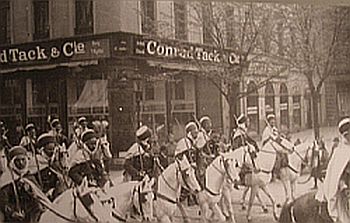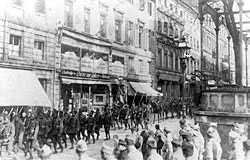After the First World War first British occupying
troops entered in the moorland of Wahn. In spring,
1919 the establishment of the "forest camp" began
behind the brick field. A guarded hutment with big
enough for about 1,000 soldiers with vehicles and
horses was originated. From 1920 the camp was used
by French troops, mostly by Moroccan colonial troops.
|
Navigation with Google Earth (must be
installed) |
|
 |
| |
 |
|
| |
Forest Camp 1919 1) |
|
| |
 |
|
| |
Leftovers of the Forest Camp 2009 1) |
|
And this time they were the winners, the citizens of
Cologne were on the loser's side. As everywhere in
Rhineland one reacted with terror and loathing.
Rhineland occupation: „The black
disgrace“
The participation of French colonial troops in the
occupation of the Rhineland and of the Ruhr after
the First World War was fought by parts of the
national press and some high-powered representatives
of economy, politics and society as they called it
deliberate humiliation of Germany by the French "hereditary
enemy".
| |
 |
|
| |
French colonial
soldiers marching in a troop parade on April
23rd 1919 in Mainz (Picture: Jewish museum,
Berlin) |
|
With calculated
outrage they referred to the "disgrace" which would
be done to the „German civilized people“, while one
put uncivilised "savages", equipped with sovereign
and military power , above the whites. To split the
allied war opponents and to isolate France in terms
of foreign policy, they referred to the dangers
which would arise of the worldwide supermacy of the
„white race“ from such actions: The colonized would
become high-spirited and would be harder to control.
| |
 |
|
| |
Colonial troops
(Tirailleurs Sénégalais) moving in on
9/3/1919, Diez, Wilhelmstrasse.
(Picture: Jewish museum, Berlin) |
|
The contemporary discourse was introduced in its
Cologne stamping by the retired major Plewig, who
was directorate of the shooting range management in
Wahn:
"A special chapter
formed the coloured, especially black French troops
[...]. On the part of the supposedly hightest
civilization, as the French state calls itself,and
cultural fighters against the German barbarians who
would threaten the world's culture, it was a
deliberate degradation of the German people, to send
such Culture bearer like Senegals and blacks, apart
from Moroccans who weren't any better though, to the
gained territory. This kind of persons are on so low
moral position which is hard to describe."
He said that the
Africans were dangerous, showed their guns often and
"[...] expelled, on
this occasion sounds similar to dog barking which
had no resemblance to any language and which nobody
was able to understand. [...] Communication with
these people was impossible, because they weren't
able to talk any known language except her throat
sound."
| |
 |
|
| |
From:
Siimplicissimus, 2/5/1923:
• 78 cases of murder and homicide
• 65 abuses and assaults
• 170 morality offences |
|
In detail Plewig
talks about the "disgraceful" feeling and the
behavior of the African soldiers that's being
discussed. Rapes happened several times, he reports;
however, these have not been talked about because of
shame. Finally, the French established a brothel
with African women on the area. The fact that the
relation was determined between African soldiers and
German women in the reality by no means by power,
becomes clear at other place:
"As well or even more
embarrassingly (than the establishment of the
brothel) was the fact that on Sundays girls, in
company of their parents came to the shooting ranges
to meet their black lovers, by train from
Grevenbroich where the blacks have probably had
their quarters before. One could even see blacks
with girls in their arms walking along the Mauspfad.
Generally it was quite a marvelous,
people-reconciling sight, but not for everybody."
In a later listing
from Plewig of incidents with occupying soldiers
only one single rape is mentioned by an African
soldier. One can suppose that he adapted himself
with his assumptions to the general lamentation of
his contemporaries. The reality, however, as it is
written in the last segment was by far different. We
known that a whole series of relations originated
between German women and African soldiers and that
children arose from these relations. b
Sources:
1) Pictures from "Lost
Sites" with the permission Christoph
Kämper.
Literature:
•
Bechhaus-Gerst, Marianne, Afrikanische
Kriegsgefangene und
Besatzungssoldaten in Wahn
•
"Besondere Kennzeichen Neger" - Schwarze im
NS-Staat. Ein
Ausstellungsprojekt des NS-Dokumentationszentrums Köln
• Stadtarchiv Porz, E 510-515, Plewig/5, Bl. 45-47.